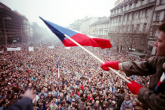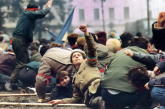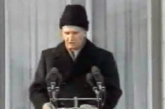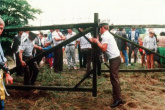A World Without Walls 2010
”An International Conference on Peacebuilding, Reconciliation and Globalization in an Interdependent World”

Gala Event: "1989 -The Year that Changed the World"
(Keynote Speech, Reception, Presentation Concert)
Monday, November 8th, 2010, 20:00 - ICD House
The World without Walls 2010 Gala event will take place on Monday, November 8th. Guests for the evening will include not only the conference participants, but also key figures from Berlin's political and diplomatic sectors, civil society practitioners, and ICD Network members. The event will provide a unique opportunity for the guests to reflect on the Berlin Wall and the importance of November 9th 1989, to expand their personal networks, and to enjoy speeches and musical performances from distinguished artists and musicians.
Program
| 20:00 | Reception Begins | |
| 20:15 | The Power of Music to Bridge Cultural Barriers (Welcome Speech) Speaker: Marcia Barrett (Boney M) |
|
| 20:30 | The Berlin Wall and its Art (Speech, Presentation) Speaker: Heinz J. Kuzdas |
|
| 21:30 | Classic Hits Concert (Live Music) Musicians: Marcia Barrett, Mike Russel, Buba Jammeh, Regis Molina |
The Berlin Wall 1961 - 1989
1989: Key Events »
In the weeks and months that followed the end of World War II, it became apparent to the world that Berlin would become the epicenter of a new ideological struggle between Capitalism and Communism. The city of Berlin was divided into 4 occupational zones, one administered by the Soviet Union and 3 others controlled by the democratic allies of the United States, France, and Great Britain. What had once been a war-time alliance, however, soon dissolved into open mistrust. Soviet refusal to agree to reconstruction plans which would make post-war Germany self-sufficient heightened tensions between the powers. In 1947, in an attempt to force the Allies out of West Berlin, the Soviets cut off all access to the city. The Allies responded by airlifting massive amounts of aid and supplies to West Berlin, which would ultimately prove successful. While the Soviets would relent and re-open access to the city, it was obvious that the reunification of East and West would only be a dream, and each would eventually be split into two separate entities: The German Democratic Republic, and the Federal Republic of Germany.Between 1945 and 1961, over 3.5 million East Germans, including many academics, engineers, teachers, and skilled workers fled to the West, many through West Berlin. They sought to escape Sovietization and enjoy the economic recovery experienced in the West. By 1961, the Soviets finally put this to an end. On the orders of GDR head Walter Ulbricht, and with the approval of Soviet Premier Nikita Khrushchev, the East German government erected a wall to close off East and West. Over the next 28 years, this "Berlin Wall" would separate people from their loved ones and stand as a symbol of oppression and persecution.
As the Cold War intensified, so did the war of words exchanged between leaders of the Democratic World and the Communist Bloc. For generations, many luminaries, from religious leaders to U.S. Presidents, understood the significance of the Wall as a physical representation of the Cold War. It was clear that as long as the Berlin Wall stood, the world would remain divided.
By the late 1980s, however, the strength of Communism began to wane. In the Soviet Union and in other countries of the Warsaw bloc, battered economies and worsening living conditions began to create unrest upon the populace. In 1987, USSR General Secretary Mikhail Gorbachev introduced Perestroika, which sought to liberalize economic and political restrictions. Gorbachev hoped to ease the economic situation, but instead, unrest turned to outright rebellion as countries under communist rule began to demand elections and outright independence from the Soviet system.
On August 23rd, 1989, Hungarian police began to remove the fence running along the border to Austria. Subsequently, thousands of East German refugees began to make their way through this hole in the iron curtain. The East German government attempted to contain its citizens within the Socialist camp by disallowing further travels to its neighboring allies, but the waves of refugees did not cease. On the contrary, despite discouragement from the state, an increasing number of East German citizens tried to reach the west, with protests in the country on the rise.
After General Secretary Erich Honecker stepped down in late October 1989, the new GDR Prime Minister, Egon Krenz, planned to allow travel between East and West Germany starting on the 17th of November.
But a mistake in the November 9th press announcement of Propaganda Minister Schabovski, in regards to the lifting of travel restrictions, led the inflating bubble of popular pressure on the regime to finally burst.
Schabovski announced to the public that the new travel laws were with immediate effect, unaware that they were not yet in effect at all. But after the people of the GDR had watched the announcement on television, thousands rushed to the checkpoints expecting an open wall. Eventually, the regime bowed before the public and the overwhelmed GDR police opened the gates.
In the weeks and months to come, the wall was torn down slowly but surely. Attempts by East German security forces to fix the holes were fleeting and ultimately futile. Today, only lines of cobblestones along the former wall sites remind one of the division of a people within a city.
The fall of the Berlin Wall marked not only the end of the Cold War, but the reunification of Germany.
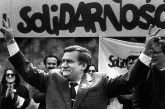
February 6th »
Solidarity negotiates
Banned trade union wins round-table discussion with Polish Govt.
more »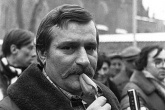
June 4th »
Crisis and Compromise in Poland
Solidarity wins historic elections; Creates political crisis
more »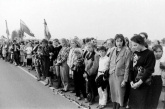
August 23rd »
Baltic Unity
The chorus of "The Singing Revolution" heard throughtout the Baltic.
more »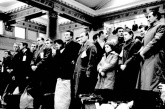
September 10th »
East Germans Free to Leave
Hungary officially lifts travel restrictions abroad
more »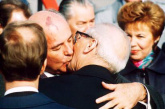
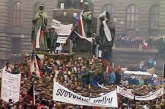
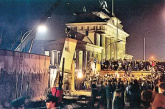
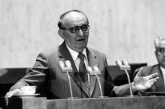
November 10th »
Bulgaria's hard liner relents
Zhivkov resigns, change sweeps through the country
more »